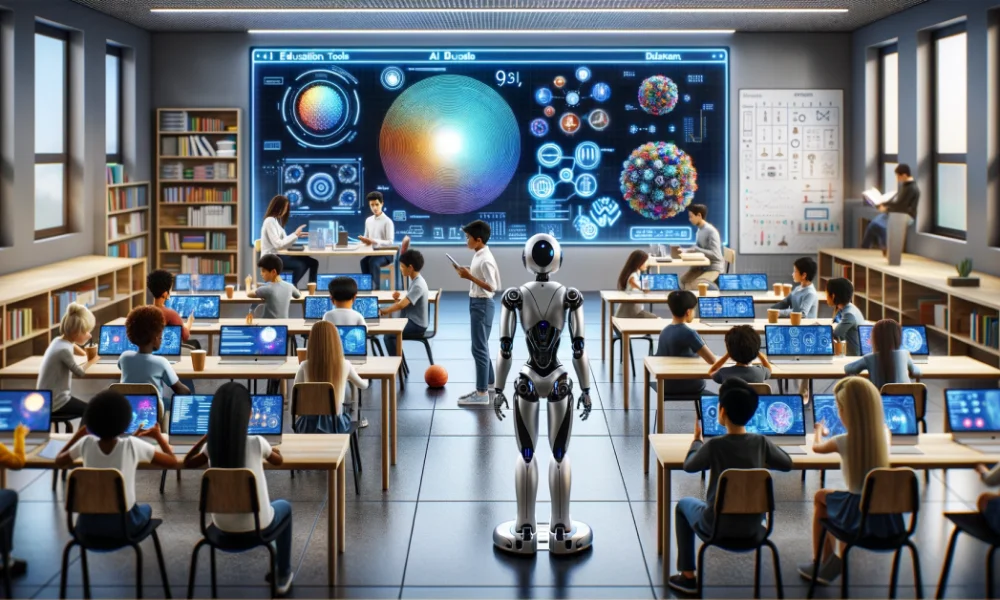Artificial Intelligence (AI) is changing many parts of our daily lives, and education is no exception. AI tutors, especially generative AI bots, have become popular tools for students in high schools and colleges. These smart assistants help students with homework, explain difficult topics, and prepare for tests more effectively. This article explores how AI tutors work, why they are widely used, and what this means for the future of learning.
What Are AI Tutors?
AI tutors are computer programs powered by artificial intelligence that can interact with students to support their learning. Generative AI bots, like ChatGPT, can understand questions, provide detailed explanations, and generate study materials. They work by using large amounts of data and advanced algorithms to produce helpful responses quickly.

Unlike traditional educational tools, AI tutors provide personalized learning experiences. Students can ask questions anytime, receive instant help, and get guidance tailored to their needs. This flexibility makes AI tutors a popular choice among learners of all ages.
How Do AI Tutors Help Students?
AI tutors assist students in three main ways:
- Homework Help
Many students face challenges completing homework assignments on time. AI tutors can assist by breaking down complex problems into simple steps. They explain concepts clearly, offer examples, and even check answers to improve accuracy. - Explanations and Understanding
Sometimes textbooks or teachers may not explain topics in a way that suits every student’s learning style. AI tutors provide explanations in different ways, making it easier for students to grasp difficult subjects like math, science, or languages. - Test Preparation
Preparing for exams can be stressful, but AI tutors help students practice by generating quizzes, flashcards, and sample questions. They also suggest study plans based on the student’s strengths and weaknesses, making test prep more efficient.
Why Are AI Tutors Popular in High School and College?
The rise of AI tutors is driven by several factors:
- Accessibility: AI tutors are available 24/7 and can be accessed from anywhere with an internet connection. This convenience helps students study at their own pace and schedule.
- Affordability: Many AI tutoring services offer free or low-cost options, making education support accessible to students from different backgrounds.
- Personalization: AI bots adapt to each student’s learning style and speed, providing customized support that traditional classrooms may struggle to offer.
- Engagement: Interactive AI tools keep students motivated by providing instant feedback and making learning fun with games, quizzes, and multimedia content.
Real-Life Impact of AI Tutors on Students
Students who use AI tutors often report improved grades and better understanding of subjects. For example, high school students struggling with algebra have found AI tutors helpful in simplifying formulas and solving equations step-by-step. College students preparing for standardized tests, such as the SAT or GRE, use AI bots to practice with realistic questions and get detailed feedback.

Teachers and parents also see benefits. Educators use AI tutors to supplement classroom teaching, freeing up time for more personalized attention. Parents appreciate that AI tools provide additional support outside school hours, helping students stay on track.
Challenges and Concerns with AI Tutors
While AI tutors offer many advantages, there are some concerns to consider:
- Accuracy: AI bots can sometimes provide incorrect or incomplete answers. Students need to verify information from trusted sources.
- Overreliance: Relying too much on AI help may reduce students’ critical thinking and problem-solving skills.
- Data Privacy: Using AI platforms often involves sharing personal data, raising privacy and security issues.
- Equity: Not all students have equal access to technology or high-speed internet, which can widen the digital divide.
The Future of AI Tutors in Education
The use of AI tutors is expected to grow as technology improves. Future AI systems may include more natural conversations, emotional understanding, and better adaptation to individual learning needs. Schools and universities are also likely to integrate AI tutors into their curricula more formally.
Educators are exploring ways to combine human teaching with AI assistance to create the best learning environment. The goal is to support students more effectively while encouraging independent thinking and creativity.
How to Use AI Tutors Effectively
To get the most from AI tutors, students should:
- Use AI tools as a supplement, not a replacement, for studying and classroom learning.
- Cross-check AI-generated answers with textbooks or teachers.
- Set clear study goals and use AI to practice specific skills.
- Balance screen time with offline activities like reading and group discussions.
Conclusion
AI tutors powered by generative AI bots are transforming how students learn in high school and college. They offer accessible, personalized, and interactive support for homework, explanations, and test preparation. While challenges like accuracy and privacy remain, the benefits of AI tutors make them a valuable addition to modern education. As AI technology evolves, these smart tutors will likely become even more integrated into students’ learning journeys, helping more learners succeed.
Also Read – This New Meta AI Chatbot Feature Will Blow Your Mind






